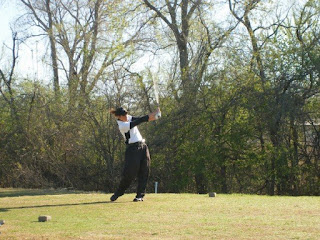"Swing Thoughts"
Once upon a time, I wasn’t a Speech-Language Pathologist. Crazy right? My identify for so many years, has been that I am an SLP. But yes, before I went into the field I was actually a golfer. That was my identify for the majority of my life. My dad, Charlie Mahon, is a Class A PGA Golf Professional. My older brother, Charlie Mahon Jr., ran golf courses for most of his career and played for UMKC in college. My older sister, Courtney Mahon, she is now an LPGA Teaching Instructor and played for the University of Arkansas in college. My mom, our biggest cheerleader! I guess you can say I was born into a golfing family and it appeared that golf would be my destiny.
I played golf throughout high school and then moved onto earning a scholarship to play for Missouri State University. I learned so many life lessons from playing golf. I learned how to be patient with myself and patient with others. I learned about ethics, being a good teammate, and how to work incredibly hard. I learned how to juggle being a full time student and a college athlete. I learned that sometimes even with hard work and trying your best, that you may not be the best, and that is okay!
My dad was my coach my entire life. He is an incredibly talented golfer and an even more talented instructor. I spent the majority of my time on the golf course. If I wasn’t at school, I was typically playing out on the course, putting, chipping, hitting range balls, or working at my dad’s golf course. All of that time gave me the opportunity to watch my dad instruct others. I was always amazed without he was able to relate the golf swing to the individual and what they knew. For example, I once overheard my dad talking about the golf swing like a dance while he was instructing a young girl who loved to dance. She was able to connect with that idea and improve her swing.
The best lesson that my dad taught me was when I was a senior in high school. I had a lot going on with my swing. If anyone of you are familiar with professional golf, for reference, my swing is a like a combination of John Daly and Jim Furyk. That is not a pretty combination! Obviously, we had a lot to work on! I was becoming incredibly frustrated during the lesson. Finally, my dad said, “we are going to pick 2 swing thoughts to work on and that’s it.” Swing thoughts, it is exactly like what it sounds like. Instead of thinking of my grip, my stance, coming over the top, my elbows, the club head, coming through, keeping my head down, etc. I was going to pick just two things to focus on. I was going to master those two things and then move on.
The concept not only significantly helped my golf performance, but it also shaped the way I approach my patients. We work with patients with complex dysphagia and communication deficits. Often times there are cognitive impairments as well that we are addressing. That can make carrying over our therapeutic interventions to day to day life, incredibly challenging. So often times, I tell my patients about my history with golf. I tell them about that golf lesson with my dad and how important it was for me to prioritize my needs, create a plan of action, and master those simple swing thoughts. Then, we create our plan. We prioritize the patient’s needs and we give a title to those needs. For example, when I am treating a voice patient, I may send them home with a list of exercises. However, I give them two very specific “voice thoughts” that I want their full priority on until I see them at their next session. Maybe their voice thoughts are “ reflux management” and “water intake.” Or maybe their voice thoughts are “water intake” and “easy onset.” These thoughts/goals are always custom to the patient’s needs.
It took me a few years of practicing before realizing how important this lesson was that my dad taught me. When I first tried it out with a patient, I was amaze with how well they connected to that idea. I have found that generally, my patients like learning more about me and my personal journey. They like to see that we all can benefit from different techniques. They like to have the specific focus that I have learned to give them. What techniques do you utilize in therapy to help focus your patients?





Comments
Post a Comment